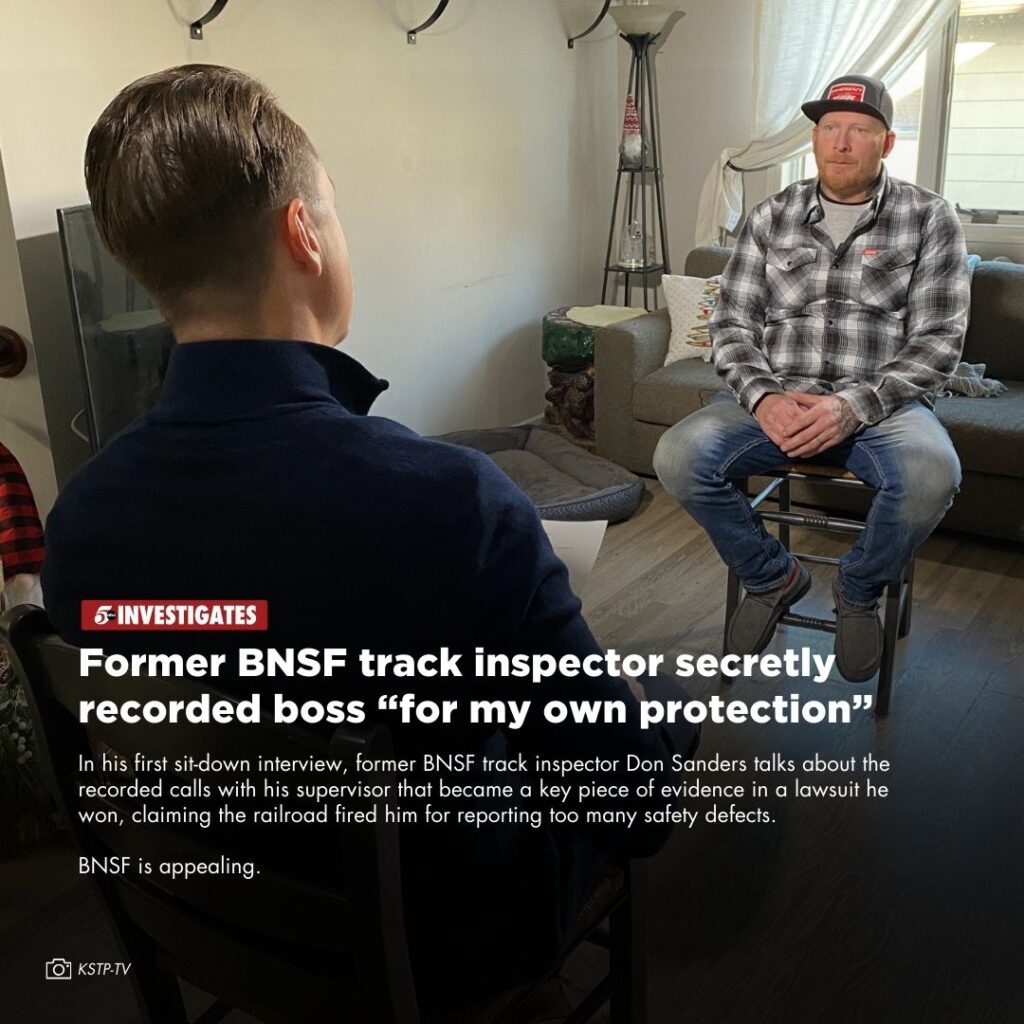Former BNSF track inspector who secretly recorded boss shares why he took on the railroad
Despite how it all ended, Don Sanders misses his time on the railroad.
“I actually made a difference in the job I was in,” he said to 5 INVESTIGATES in his first sit-down interview about his ongoing fight with Burlington Northern Santa Fe (BNSF).
Sanders spent nearly a decade with BNSF, mostly in the critical job as a track inspector – a job he loved until he said the railroad cut too many corners.
“I don’t want to be the scapegoat if something happened,” Sanders said.
It’s why he says he started recording calls with his boss that 5 INVESTIGATES first aired as part of a series of reports last summer that focused on railroad safety.
The calls later became a key piece of evidence in Sanders’ wrongful termination lawsuit against the railroad. He said he was fired for reporting too many defects.
“Every single time that I either called or someone was calling me, I turned it on,” Sanders said of the recordings.
BNSF MANAGER: Why in the world would we ever call FRA about anything? Unless I’m absolutely telling you to break the rules or don’t do something.
SANDERS: They know the rule book better than anybody. Keith, have I ever called the FRA on you because you told me not to follow the rules like you do all the time? No…
As the country focuses on rail safety following derailments here and around the country, Sanders’ recordings raise new questions about internal operations at the railroad.
The calls recently found a national audience in December when “Last Week Tonight” host John Oliver featured the calls on his show.
“That is automatically suspicious,” Oliver quipped after playing the clip of Sanders being berated for calling the FRA.

“If you work in a restaurant and your boss tells you under no circumstances should you ever call the health inspector, best case scenario he is being ratatouille’d,” Oliver said.
5 INVESTIGATES asked Sanders what it meant to him that people are now listening.
“It kind of opens up other people’s eyes that might be in another job safety-driven career, as to be able to stand up and do something right,” he said.
BNSF previously said that it “does not retaliate against employees.”
After a recent conference about railroad safety in Atlanta, a company representative told 5 INVESTIGATES that “we encourage all of our employees to report things that are happening on our railroad,” adding that safety is the “center of our culture and what we do.”
The company later touted internal stats they say shows their commitment to safety, including that defect-related derailments are down by 73% in the Twin Cities.
But in 2021, a federal jury sided with Sanders’ claim that BNSF fired him in retaliation.
His case also raises questions about how bonus pay for managers is tied to their ability to keep trains moving and defects at a minimum.
SANDERS: So in order to keep you from getting fired, I need to just look the other way?
BNSF MANAGER: No. We just need to have a conversation.
The federal jury initially awarded Sanders $9 million, but federal limits knocked it down to more than $2 million.
“Probably the best thing I’ve heard in a long time because that’s pretty much when I wanted to clear my name, so it was very relieving,” he said.
Sanders said the years-long fight with the railroad took a toll on his mental and physical health and tore apart his family.
“It meant more to me to show my kids that I did something right,” he said. “I was pretty depressed when I got fired. So, yeah, it was great.”
Sanders has yet to see any of the money that he was awarded in the case against BNSF. That is because the railroad is currently appealing the federal jury’s verdict.
Coming up Thursday at 6:00 p.m., 5 INVESTIGATES will have more of BNSF’s response to our reporting on rail safety.